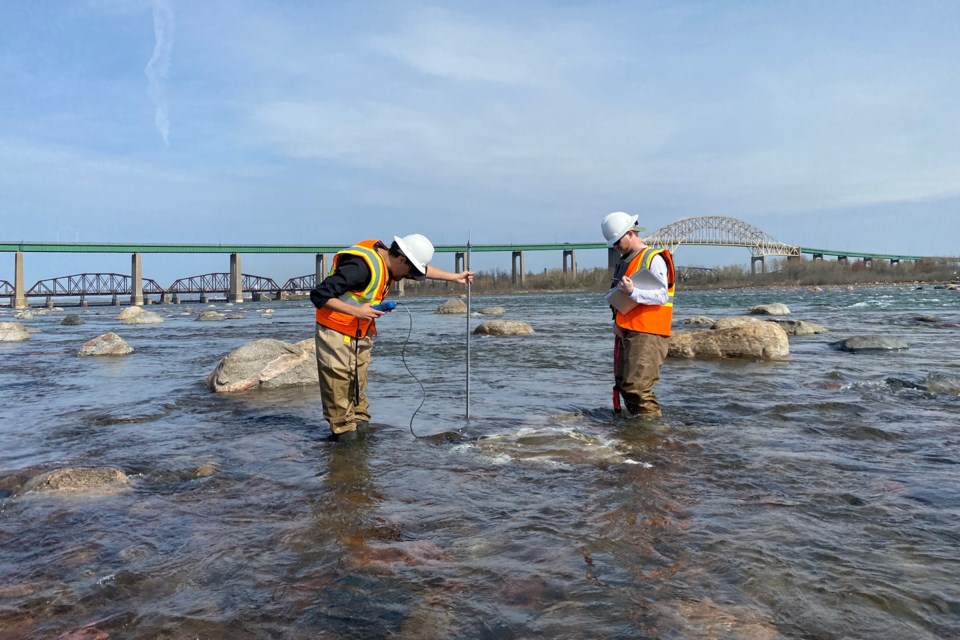The Canadian government is committing nearly $4 million for oil spill research that will involve universities on both sides of the St. Marys River as lead partners.
Lake Superior State University said today that the funding will support research into ways to protect Canada's marine and coastal areas.
A dozen organizations and 24 scientists from both the U.S. and Canada, including Algoma University as lead partner along with LSSU, will conduct the research under an international consortium.
More details are in the news release that follows:
Lake Superior State University (LSSU) is proud to announce a substantial funding allocation of $3.87 million from the Government of Canada, supporting the International Consortium on Oil Research for Our Waters of the North (ICOR-OWN). This collaboration unites 12 organizations and 24 scientists from both the United States and Canada, with LSSU’s Center for Freshwater Research and Education and Algoma University as lead partners.
The funding, unveiled by the Honourable Jonathan Wilkinson, the Canadian Minister of Energy and Natural Resources, is part of the Multi-Partner Research Initiative (MPRI), a five-year, $30.3 million commitment under Canada's Oceans Protection Plan (OPP). The MPRI's goal is to advance scientific knowledge, develop cutting-edge cleanup technologies, and enhance response strategies to safeguard Canada's marine and coastal areas.
Under the umbrella of the International Consortium, the following research networks have been awarded funding:
- CA$646,758 for Research on Oil Fate in Freshwater Ecosystems: In collaboration with the US Geological Survey, Memorial University, and the US Coast Guard, LSSU will investigate the fate, behavior, and transport of oil in freshwater ecosystems, with a specific focus on diluted bitumen.
- CA$1,466,695 for Oil Spill Detection and Monitoring Technologies: LSSU, working alongside Algoma University, University of Windsor, the National Oceanic and Atmospheric Administration, the environmental science and engineering firm Limnotech, and the University of Michigan’s Cooperative Institute of Great Lakes Research, will develop and evaluate technologies for oil spill detection and monitoring in freshwater and ice environments. This includes an innovative integrated drone and long-range autonomous underwater vehicle system, as well as low-cost in-situ oil detection systems for rapid response efforts.
- CA$1,756,000 for Ecological Effects of Oil Spills in Cold-Climate Ecosystems: LSSU, in partnership with Algoma University and University of Windsor, will examine the ecological impacts of oil spills and bioremediation in cold-climate ecosystems, with a focus on coastal wetlands of the Laurentian Great Lakes.
LSSU Interim President Lynn Gillette expressed excitement about the collaboration, stating, "We are thrilled to lead this international initiative alongside our Canadian partners, including our international neighbors at Algoma University. The collaboration highlights our new College of Great Lakes Ecology and Education and LSSU’s reputation as a growing leader in freshwater science. This exciting initiative will create numerous opportunities for our students to engage in real-world science on a multinational issue that will contribute directly to Great Lakes conservation."
Dr. Ashley Moerke, LSSU’s lead of the International Collaboration on Oil Research and Dean of the College of Great Lakes Ecology and Education, commented, "ICOR-OWN is leveraging LSSU and Algoma University’s scientific expertise and resources and our unique location, at an international border and the nexus of the upper Great Lakes, to build scientific capacity and training, ensuring that the best available science is used to understand, minimize, and respond to oil spills in cold, freshwater environments."
ICOR-OWN has secured funding for a four-year period and is closely coordinated with and contributes to the ongoing research efforts led by the US Coast Guard’s Great Lakes Oil Spill Center of Expertise. This center is located at LSSU’s Center for Freshwater Research and Education along the St. Marys River, representing a significant investment by the United States in the field of oil spill research.
Dean of the Faculty of Science at Algoma University, Michael Twiss states, "When it comes to Great Lakes water protection, Algoma aims to make a positive impact. We are proud to co-lead this consortium in collaboration with our close partner, Lake Superior State University. This significant funding from the Government of Canada reflects our joint commitment to advancing scientific knowledge and protecting the North's pristine waters. This international initiative highlights Algoma University's dedication to environmental protection and contribution to ongoing research in cold, freshwater environments for a sustainable future in the Great Lakes and beyond for present and future generations."



